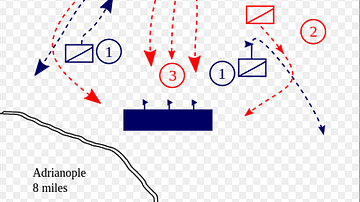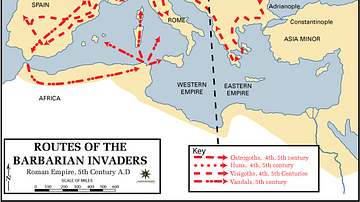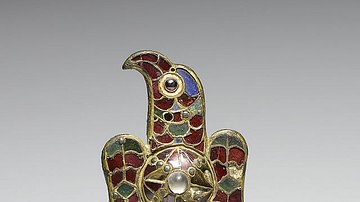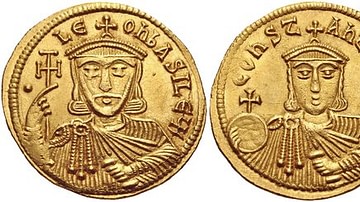Search
Summary 
Loading AI-generated summary based on World History Encyclopedia articles ...
Search Results

Definition
Battle of Adrianople
The Battle of Adrianople on August 9, 378 CE ranks among the worst military defeats in all of Roman history. Its estimated losses of over 10,000 are comparable to Roman defeats at Cannae (216 BCE) and Carrhae (53 BCE). The battle pitted the...

Image
Battle of Adrianople 378 CE
Battle of Adrianople, 378 CE.

Definition
Fritigern
Fritigern (also Fritigernus, died c. 380 CE) was a Visigothic king best known as the victor of the decisive Battle of Adrianople in 378 CE, which decimated the Roman army and haunted Roman military commanders for decades afterwards. He was...

Definition
Western Roman Empire
The Western Roman Empire is the modern-day term for the western half of the Roman Empire after it was divided in two by the emperor Diocletian (r. 284-305 CE) in c. 285/286 CE. The Romans themselves did not use this term. At its height (c...

Definition
The Goths
The Goths were a Germanic tribe who are frequently referenced for their part in the fall of the Roman Empire and their subsequent rise to power in the region of northern Europe, initially in Italy. Prior to their contact with Rome they must...

Definition
Visigoth
The Visigoths were the western tribe of the Goths (a Germanic people) who settled west of the Black Sea sometime in the 3rd century CE. According to the scholar Herwig Wolfram, the Roman writer Cassiodorus (c. 485-585 CE) coined the term...

Definition
Athanaric
Athanaric (died c. 381 CE) was a king of the Thervingi Goths (better known as the Visigoths) and, according to some sources, the first and greatest king. He was of the noble Balts family of the Thervingi tribe and a relative of the later...

Definition
Leo V the Armenian
Leo the V the Armenian was emperor of the Byzantine Empire from 813 to 820 CE. He was of Armenian descent and the last ruler of the Isaurian dynasty which had been founded by Leo III (r. 717-741 CE). The emperor's reign, after early military...

Article
Fall of the Western Roman Empire
To many historians, the fall of the Western Roman Empire in the 5th century CE has always been viewed as the end of the ancient world and the onset of the Middle Ages, often improperly called the Dark Ages, despite Petrarch's assertion. Since...

Definition
Mavia
Mavia (r. c. 375-c. 425 CE) was a warrior-queen of the semi-nomadic Tanukhid Arab tribe of Syria and Jordan who led a successful insurrection against Rome in 378 CE. She is also known as Maowiva, Mu`awiya, Mauia, Mania, and Mawiyya. Her control...